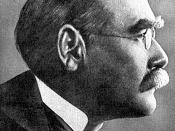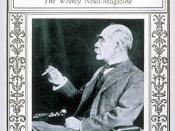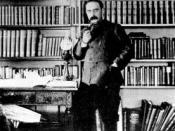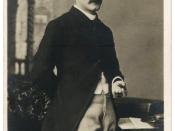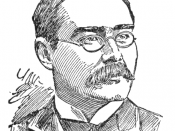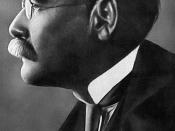First-person narrative is employed in Rudyard KiplingÃÂs The Man Who Would Be King. There are three kinds of narrative techniques, namely, first-person narrative, second-person narrative, and third-person narrative. A first-person narrator is one that is also a character in the story, who uses words and phrases to refer himself/ herself as ÃÂIÃÂ. Such literary technique can be further divided into mainly three categories. For first person main character narration, the narrator is the main character in the story. Thus, the narrator should appear in most of the scenes in the story and at least learn about the things that happened in scenes that he/ she is absent. When the main character is not suitable for being a narrator, due to personality or his/ her destination as having died in the story, first person secondary character narration is used. Another kind of narrator is the first person independent narrator.
According to Fields, this kind of narrator is similar to an omniscient narrator in that he/ she knows everything, can take readers anywhere and show them everything; and different in that he/ she is ÃÂdefinitely not objectiveÃÂ and presents a specific personality. By the above definitions, it can be concluded that the unnamed journalist in The Man Who Would Be King is a first person secondary character narrator, since he is definitely not omnipresent, nor did he take part in the ÃÂLoafersÃÂÃÂ journey to Kafiristan.
One of the most basic responsibilities of a first person narrator is that he/ she has to be a part of the story. He/ she has to be a witness to the major events in the story so as to provide a text with a reasonably substantial plot to readers. A first person narrator that has reached a certain level of credibility and likability, often through his/ her personality that the author creates, serves a function of making the story more convincing and in touch with reality. On the other hand, a narrator that is not trustworthy enough to make everything he/ she said convincing bears a role of hinting the readers to what extent they should believe in him/ her. Bransford has pointed out first person narratorÃÂs another important role of being a filter when advising writers on how to write this kind of narrative:ÃÂThe absolute most important thing to keep in mind as you're crafting a first person narrative is that everything that occurs has to be filtered through your narrator's perspective. Everything the reader sees is therefore infused with the narrator's personality and pathos. Things don't just happen in a first person narrative, they happen through the narrator's perspective.
The really compelling first person narrators are the ones where a unique character is giving you their take on something that is happening, and yet it's clear to the reader that it's not the whole story. You're getting a biased look at the world, which is central to the appeal of the first person narrative.ÃÂIn The Man Who Would Be King, the English journalist serves as an internal reader of the story. Having a respectable career as being a journalist, he is expected to be an unbiased and trustworthy reporter of news and stories who can express ideas with words profoundly. Thus, a journalistÃÂs job is similar to that of a narrator. By his professionalism on the use of language and his being a civilized middle-class Englishman, the journalist in The Man Who Would Be King has apparently fulfilled the role of gaining credibility and acceptance as a narrator from the readers. By correcting the grammatical mistakes of Carnehan and asking questions to make him organize his words better, the journalist is somehow trying to make sense of Dravot and CarnehanÃÂs adventure and thus ÃÂlegitimizeÃÂ the matter. Thus, to a certain extent, the journalist has made the story more convincing than it would have been if the mentally ill Carnehan was the narrator instead.
However, since the journalist is not a witness to Dravot and CarnehanÃÂs being Kings in Kafiristan and all the information he has got comes from Carnehan whose ÃÂhead isnÃÂt as good as it might beÃÂ (Kipling, 260-261), the reliability of the story is greatly diminished. Any sense that he has made becomes a ÃÂdeliberately uncertain ÃÂlegitimizationÃÂ of the storyÃÂ (Shippey and Short, 76). Contrast, for example, between the journalistÃÂs workplace and Kafiristan; between his ÃÂskilful, reasonable but no longer entirely self-confident styleÃÂ (Shippey and Short, 79) and CarnehanÃÂs confusing, grammatical-and-sequential-mistake-filled speech, etc. appear often in the story. This has pointed out ÃÂPeacheyÃÂs madnessÃÂ (Shippey and Short, 80), further widening the gap between the two parties. The chance of the journalist misunderstanding CarnehanÃÂs words thus increases.
While it is easy for readers to unconsciously fall into the trap in reckoning the first person narrator as the author himself, it is necessary for them to be wary of the stance held by the narrator and the author. Readers should always bear in mind that the narrator is only a construct and a made-up character of the authorÃÂs. Although writers employ characters in the story to bring about the ideas that they want to convey, and sometimes the narratorsÃÂ stance represents that of the writersÃÂ, the narrators should still be perceived separately from the writers. In The Man Who Would Be King, the similar backgrounds and careers between the journalist and Rudyard Kipling make the situation confusing enough to deceive the readers into believing that the journalist is Rudyard Kipling himself. ReadersÃÂ understanding of the story would thus be affected by their previous knowledge and perception about the author.
Some readers might mistake a first person narrator to be an omniscient narrator, who is considered to be relatively more objective and unbiased. It is important for readers to realize that ÃÂall narrators are unreliable up to a pointÃÂ (Duncan). First person narrators have the unique role to ÃÂtip off the reader as to what's truthful and what's notÃÂ (Duncan). The narrator might have his/ her own motivations in telling a story. He/ she might also ÃÂmanipulate his (/her) own memories intentionally or not.ÃÂ The journalist in The Man Who Would Be King, though does not appear to be having his own motivations, is ÃÂa filter, a censor, on occasion a liar, and he is well aware of it.ÃÂ (Shippey and Short, 77). It is all up to the narrator to decide how much to reveal and how to reveal. Thus, readers should always be careful in choosing and evaluating by themselves how much and what to trust about the narrators. They should try their best to draw into details and dig up hidden messages in order to pick up the essence of the story. Sometimes they have to think more deeply and critically as to consider the narratorÃÂs intention and situation.
Bearing an unusual role as a first person narrator who reports the story which he learnt from a mentally sick person, the journalist himself might not be sure how reliable CarnehanÃÂs words are. In such a story with framed structure, myths are never solved. How beautifully a book is written does not depend on how trustworthy the narrator is, but how the author has hinted and revealed to the readers on what to trust about the narratorÃÂs words, and eventually get the correct message from the author.
Bransford, Nathan. ÃÂFirst Person or Third Person?ÃÂ Nathan Bransford- Literary Agent (2007). 25 Feb 2008.
< http://nathanbransford.blogspot.com/2007/07/first-person-or-third-person.html>Duncan, April. ÃÂPoint of View: First Person.ÃÂ FictionAddiction.Net. 25 Feb 2008.
Fields, Jan. ÃÂFirst Person Fabulous.ÃÂ Institute of ChildrenÃÂs Literature (2006). 20 Feb 2008.
< http://www.institutechildrenslit.com/rx/wt07/fabulous.shtml>ÃÂFirst-person Narrative.ÃÂ Wikipedia (7 Feb 2008). 20 Feb 2008.
< http://en.wikipedia.org/wiki/First-person_narrative>Kipling, Rudyard. The Man Who Would Be King And Other Stories. Great Britain: Oxford University Press, 1999.
